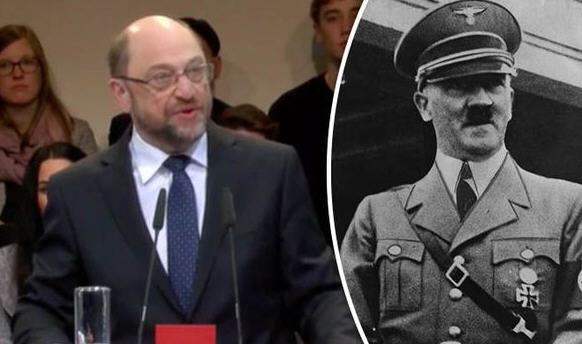Martin Schultz összehasonlítása Adolf Hitlerrel nevetséges, de nem független attól a ténytől, hogy a német szociáldemokraták vezetőjeként fontos posztot tölthet be a jövőbeni német kormánykoalícióban. Schultz Orbán Viktor kemény bírálói közé tartozik. Ezért nem kizárt, hogy Soros György után ő és az Európai Egyesült Államokról alkotott elképzelése lesz az új ördög – írja Balogh S. Éva a Hungarian Spectrumon.
Viktor Orbán has never been fond of answering questions. When accosted by journalists at home, he either says nothing or comes up with some flippant answer. Until recently, however, he was quite ready to talk to journalists while abroad. He has always been willing to give long interviews, mostly to German papers, and to hold press conferences after European Council summits. On these occasions he normally bragged about the important role he played during the negotiations, often claiming that he “vetoed” certain otherwise unanimous decisions. But on the last two occasions, he skipped his customary appearance before the journalists altogether.
This was the case this time as well, but the Hungarian prime minister, perhaps imitating Donald Trump, decided to communicate directly with “his people.” The only difference is that he uses Facebook instead of Twitter, which is a great deal less popular in Hungary than in the United States. Short videos are available on Orbán’s Facebook page, with English subtitles provided.
Yesterday I summarized his messages, but since then three more Orbán announcements were posted. The first was recorded right after the working dinner of the prime ministers/chancellors at which the question of migration was discussed. He described the meeting as a “political hand-to-hand combat” in which “the Poles, the Czechs, the Slovaks, the Slovenes, and we managed to defend our positions.” The military theme is even more obvious in the Hungarian original, in which he used the word “hadállás,” which signifies a military position. No one argued against the necessity of secure borders, he continued, but “the great and strong ones want to bring the migrants into Europe and distribute them on a compulsory basis.” In his final video, he thanked those who had expressed their opposition to placing migrants in Hungary, which helped him “to repel the assaults that nearly managed to violate the sovereignty of Hungary again.”
Orbán’s description of the meeting conjures up a noisy, passionate verbal fight between two antagonistic sides, but other participants called the discussion dispassionate and calm. No charge against the military flanks at all. If I interpret the majority view on the matter of distribution of refugees correctly, the best the Visegrád Four can hope for is a slight modification, not an abrogation of the decision that had been accepted by the European Council earlier. It is possible that “qualified majority rule” will suffice for approval, which would mean defeat for the Visegrád Four’s position.
Viktor Orbán might not like to expound in front of local journalists, but János Lázár, his chief-of-staff, is quite happy to go on for a couple of hours every week to entertain the troops. Lázár is known for his brashness and his hyperbole. He might be amusing at times, but a few hours after these meetings one usually learns that what Lázár claimed was simply untrue or at best misleading. The Budapest correspondent for the Associated Press, who speaks Hungarian, is usually on hand for these Thursday afternoon press conferences. He immediately sent out the news that János Lázár and László Surján, the former vice-president of the European Parliament, had compared Martin Schulz, former president of the European Parliament and currently head of the German Social Democratic party, to Adolf Hitler. It didn’t take more than an hour for me to be able read this juicy story on ABC’s news site.
What happened that prompted this outrageous comparison? On December 7 Schulz wrote the following message on Twitter: “I want a new constitutional treaty to establish the United States of Europe. A Europe that is no threat to its member states, but a beneficial addition. A convention shall draft this treaty in close cooperation with the civil society and the people. Its results will then be submitted to all member states. Any state that won’t ratify this treaty will automatically leave the EU.” This tweet was discovered a week later by two members of the Hungarian Christian Democratic Party–Péter Harrach, the whip of the KDNP parliamentary delegation, and László Surján, who, as far as I know, by now plays no official political role. Péter Harrach, who is anything but flamboyant, compared Schulz to Ferenc Gyurcsány. Both men are “lots of talk without substantial achievement.” Surján said that Schulz’s voice “reminded him of Adolf Hitler,” which he “found unacceptable.” The two held a press conference to announce their disapproval of Schulz and his United States of Europe.
It seems that Lázár especially liked Surján’s comment and decided to use the comparison at his press conference a few hours later. He added a few extra words. He not only heard “Hitler’s voice” but claimed that “the last time Hungary received such an ultimatum was from Adolf Hitler.” Of course, such a comparison is ridiculous, and we must assume that the sudden interest in Schulz is not independent from the likelihood that a grand coalition will be formed in Germany and that Schulz will be part of the cabinet in some important position. Schulz is known to be a very harsh critic of Viktor Orbán. Perhaps after Soros the new devil will be Schulz and his plans for a United States of Europe.




































